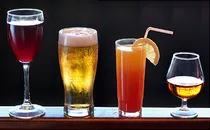
Potbelly Points To Cardiac Problems
While one research identified heavy drinking as a risk factor, most studies find no link between drinking alcohol & prostate cancer risk.
What Research Say
The good news
Several research papers summarised that drinking alcohol had no effect on a man’s risk of prostate cancer. As a matter of fact, global studies of men and women found substantial benefits from alcohol. In particular, men who drink moderately enjoy considerable protection against heart attacks, sudden cardiac death, and ischemic strokes.
The magnitude of alcohol protection varies with the problem but ranges from 20% to 56%. Other possible benefits of small alcohol consumption include a reduced risk of diabetes, symptomatic benign prostatic hyperplasia (BPH), and erectile dysfunction. That is the good news as far as it goes

The bad news
The bad news is that alcohol gets blamed for thousands of deaths each year. Liver disease and accidents are among the significant alcohol-related problems, Others include high blood pressure, damage to the heart muscle, brain damage, and pancreatitis. As well as osteoporosis, intestinal bleeding, and cancers of the mouth and upper digestive tract. Alcohol has also caused countless psychosocial and economic problems.

Is Alcohol A Benefit Or Trouble?
It depends on who drinks, how much, and when. Hence, people who are at risk for alcohol abuse should avoid it. As well as patients with liver disease and those who require medications that may interact adversely with alcohol. But, if you decide to drink, keep the dose right. This means if you are a man, one drink a day, counting 1½ ounces of liquor, and 12 ounces of beer. Or 5 ounces of wine as one drink. As for women, it is half that amount.

Lifestyle, Alcohol & Prostate Cancer Risk
While prostate cancer is the most common internal malignancy in men, the causes are not yet understood. Although genetics plays a definite role, lifestyle factors are equally very important. With more attention given to nutritional diet. This is because the major trigger is saturated fat from animal sources, such as red meat and whole dairy products. On the other hand, very high consumption of calcium or omega-3 fat may also boost risk. However, tomatoes and other vegetables, whole grains, nuts and seeds, fish, and soy are all on the ‘good’ food list. Furthermore, among the nutrients, selenium, and lycopene may reduce risk.

On the impact of obesity, smoking, sexual activity, and heavy drinking on prostate cancer, there are varying levels of risks and benefits. For example, while obesity increases prostate cancer risk, exercise may lower it. As regards smoking, most studies report little impact. But it is good to keep in mind the ‘smoking is dangerous to your health’ campaign. On sexual activity, one study reported that having multiple female sexual partners may increase risk. But another linked frequent ejaculation to protection.
Lastly, the research identified heavy drinking as a risk factor. However, other pieces of research find no connection between drinking alcohol & prostate cancer risk. In fact, an analysis of 33 individual research papers concluded that drinking had no impact on a man’s susceptibility to prostate cancer.

Red Wine And Prostate Cancer Risk
Furthermore, researchers investigated alcohol & prostate cancer risk in 1,456 men between 40 and 64 years of age. The results confirmed that the risk of prostate cancer was increased in men with a family history of the disease. Particularly in African Americans, men with high caloric consumption, smokers, and men who have had many female sexual partners. In addition, most of the men had localized diseases of moderate aggressiveness.

Red wine scored high on reduced prostate cancer risk
Initially, there was no relationship between the overall consumption of alcohol & prostate cancer risk. But the researchers went one step further by evaluating each type of alcoholic beverage on its own. The results showed that heavy beer drinking (35 or more a week for eight years or longer) appeared to increase risk. In contrast, wine drinking was linked to a reduced risk of prostate cancer. And when white wine was compared to red, most of the benefit was attributed to red.
Even low amounts seemed to help. And for every additional glass of red wine per week, the relative risk declined by 6%. In all, men who averaged four to seven glasses of red wine per week were only 52% as likely to be diagnosed with prostate cancer, as those who did not drink red wine. In addition, red wine appeared particularly protective against advanced or aggressive cancers.
Why Red Wine?
Most of the assumption focuses on chemicals that are absent in other alcoholic beverages, including various flavonoids and resveratrol. These components have antioxidant properties. And some appear to counterbalance androgens, the male hormones that stimulate the prostate.
In an experiment, flavonoids reduce PSA production by prostate cancer cells. While resveratrol reduces the activity of the genes that promote cell growth. Resveratrol also encourages prostate cancer cell death through a process called apoptosis (cell suicide).

A Toast To Your Health?
It is not difficult to understand the reason why doctors are not likely to recommend alcohol for health anytime soon. Doctors are wary of the tendency for patients to drink more alcohol than necessary. Particularly in a situation when they think a little alcohol is good. So, more will certainly be better.
However, men who enjoy alcohol and drink moderately may benefit from a lower risk of heart attack, stroke, diabetes, and cardiac death. Although red wine has hypothetical benefits, its superiority over other forms of alcohol has not been proven scientifically. Essentially when it comes to fighting cardiovascular disease.

Photo Credit: Creative Commons


